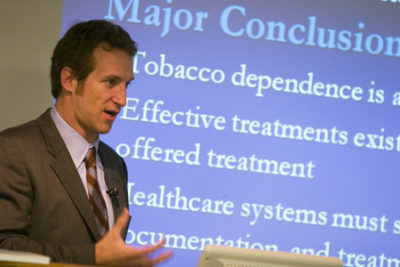Kevin Hoffman says responsible role models, health-conscious messages needed
Like most Americans, Kevin Hoffman is anxious to see U.S. military troops moved out of harm’s way. No, he’s not a protestor or political activist. He is a scientist, and the “harm” that he is concerned about is tobacco.
Hoffman, who is pursuing his Ph.D. in clinical psychology at UMKC, has been studying the pervasiveness of tobacco use in the military, focusing on the dynamics of military life that can leave many young soldiers vulnerable to mixed messages about the dangers of tobacco.
“The prevalence of tobacco use in the military is significantly higher than in the general population,” Hoffman said. “There are a variety of factors that contribute to that phenomenon.”
To get a clearer sense of some of those factors, Hoffman and his colleagues conducted a total of 24 focus groups at six military installations. Their goal was to examine the extent of smoking during deployment and to explore the factors that might contribute to new initiation, relapse and increased smoking among junior-enlisted personnel — who have the highest smoking rates in the military — and their superiors.
Attacking the Problem
One of the most dominant factors is the influence that older soldiers who smoke or chew tobacco have on younger recruits, Hoffman suggests.
“Taking up smoking in the service may be an effort by younger soldiers to emulate the tough, combat-seasoned veterans who train them,” Hoffman said. “Just like adolescents, newer servicemen and women look up to their superiors and want opportunities to strike up friendships and socialize. If that means smoking in order to spend break time with the brass, then that’s what they do.”
Hoffman has some good arguments to use with young enlistees.
“One thing that weighs heavily on them is the knowledge that they are admired and respected by children and teens — especially their own,” he said. “None of them want to be the role model that led a youngster to take up smoking.”
Another major obstacle in combating smoking in the military, according to Hoffman, is the longstanding relationship between the tobacco industry and the military. Tobacco-growing state legislators and industry lobbyists routinely fight efforts to take away a soldier’s “benefit” and “right” to cheap tobacco products at base commissaries, he said.
The military did make some progress in implementing tobacco-control policies beginning in the 1980s, Hoffman admits. After many years of decreasing prevalence, however, rates of both smoking and smokeless tobacco use among enlisted personnel in recent years have remained static in some branches of the military and have actually increased in others.
Winning the War
Hoffman hopes to employ some of the same tactics in addressing the problem of tobacco use in the military that have proven successful in the civilian sector. Last year, for example, through Hoffman’s work with the local American Cancer Society office, he conducted a series of presentations to local United Parcel Service (UPS) employees on the consequences of continued tobacco use.
“Because the UPS workplace is smoke-free, some employees had switched to smokeless tobacco, a product with similar addictive properties and dangers for its users,” Hoffman said.
Hoffman showed UPS employees the realities of cancer. He presented pictures of cancer survivors whose tongues or jaws had to be removed by surgery. Hoffman also illustrated the correlation between tobacco use and serious health issues, such as elevated blood cholesterol and impotence.
Furthermore, Hoffman instructed UPS trainers on how to continue educating their employees about the potentially dangerous consequences of tobacco use. At the same time, he encouraged UPS trainers to consider how their own use of tobacco might be influencing younger employees to take up the habit.
As a result of Hoffman’s work, several dozen UPS employees in Kansas City pledged to give up tobacco. Now, more than 300,000 UPS employees nationwide can access Hoffman’s presentation through the company’s internal Web site.
Hoffman hopes that a similar approach can be successfully adopted to address tobacco use in the military. He is currently working on his Ph.D. dissertation, which details policies and programs the military can implement to reduce its tobacco use rates.
“The Veterans Affairs hospitals have long waiting lists for soldiers diagnosed with tobacco-related cancers,” he said. “This is a completely preventable health issue and we owe it to our men and women of the Armed Forces to do a better job of protecting them.”

